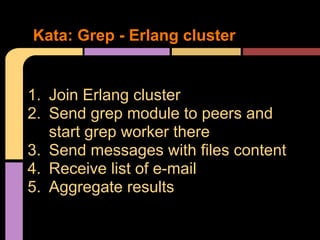Coding Dojo: Erlang
- 1. Coding Dojo: Erlang Arkadi.Shishlov@gmail.com Vladimir Tarasow netrat@netrat.eu
- 2. Today's tools â Erlang/OTP â EUnit â Rebar â IntelliJ IDEA 11 CE + Erlang plugin â ERL shell â MochiWeb's reloader.erl https://github.com/mochi/mochiweb/blob/master/src/reloader.erl â erldocs.com
- 3. Some other day tools â Agner â Sublime Text 2 + SublimErl â Eclipse + ErlIDE â Emacs â Elixir
- 4. Erlang in nutshell â Functional language â Unusual syntax â Forces into concurrent programming paradigm â Robust VM â Patterns for scalable services â OTP
- 5. How's your Erlang homework?
- 6. Kata: Grep 1. Local file-system directory and its subdirectories contains large number of text files 2. Extract unobfuscated e-mail addresses; together with people names, if possible 3. Write the list of unique e-mails into specified output file
- 7. Coding Dojo
- 8. What is the Coding Dojo? Coding Dojo is a meeting where a bunch of coders get together to work on a programming challenge. They are there to have fun and to engage in Deliberate Practice in order to improve their skills.
- 9. Roles â Sensei â Moderator â Pair: â Pilot â Navigator â Audience
- 10. Sensei Responsible for: â No long discussions without the code. â Working code by the end of the iteration. â Tests are written during the iteration. â Green tests by the end of the iteration, otherwise the next iteration begins by making tests green. â Progress on fulfilling the Kata.
- 11. Moderator Responsible for: â facilitating attendees to obey the working agreements â conducting the retrospective
- 12. Pair Pair of two developers working and talking at the PC in order to complete the Kata. Pair consists of the pilot and the navigator. The pilot codes and the navigator helps the pilot to understand what has been done in the previous iterations and what the pair should do now.
- 13. Principles Working on Kata At the Dojo one can't discuss a form without code, and one can't show code without tests.
- 14. Principles Timeboxing Pair works during a fixed period of time. Switching The person who enters into the coding timebox begins to act as a pilot. The person who was the pilot during the previous iteration switches to the position of the navigator.
- 15. Respect â Ringtones of mobile phones are off. A person can answer a call, but he or she must leave the room to do it. â Only the pair at the PC can talk loud. â Sensei can interfere and talk loud by his or her own decision.
- 16. Respect â All discussions away from the PC must be made in the way not to spoil the pairâs deep diving into the Kata. â If a person wants to ask or suggest smth to the pair, he or she should raise the hand and wait for the moderator for permit. â Only one person from the observers can talk at a time.
- 18. Working agreement ? Randori, Parisian, Pairs ? â Applicability of unit and functional tests â Randori round time â Switching: round-robin, by request
- 19. Kata: Grep - Erlang cluster 1. Join Erlang cluster 2. Send grep module to peers and start grep worker there 3. Send messages with files content 4. Receive list of e-mail 5. Aggregate results
- 20. Join Erlang cluster 1. Ping LAN bootstrap nodes - bootstrap@extensa - bootstrap@hal9011 2. Workes are: + nodes() - worker if name starts with "worker" *except coordinator local VM [node()] to simplify programming and prevent aggregator bottlenecks
- 21. Send code to peers 1. The functionality is implemented by module 'grep' 2. 'grep' is also an (Erlang) application 3. use code:get_object/1 to read the module beam 4. use rpc:(multi)call/4, code:load_binary/1, erlang:spawn/4 to load beam and start application remotely
- 22. Send work 1. API signature: grep:grep(Dir) -> [ email1@domain, email2@domain2 ] 2. Obtain list of workers by calling nodes/0 3. Scan directory recursively and create a tuple: Work = { self(), Content } 4. Send message to next peer: { grep_worker, Node } ! { self(), Work }
- 23. Receive result 1. After all work units are sent - receive all replies or timeout occur: recv(N) -> c:flush(), recv([], N). recv(A, 0) -> A. recv(A, N) -> receive {emails, Mails} -> recv([Mails | A], N-1) after 1000 -> A end. 2. Flatten, sort, uniq results
- 24. Worker workflow with OTP 1. Use OTP gen_server and supervisor behaviour-s with simple_one_for_one strategy 2. application:start/1 calls grep:init/1 3. grep:init/1 spawns a number of workers that is equal to core count as returned by erlang:system_info(schedulers) 4. grep:init/1 registers all workers with global: register_name/2
- 26. Latvian Developers Network http://www.ldn.lv http://fb.me/LatvianDevelopersNetwork @LVDevNet Arkadi Shislov arkadi.shishlov@gmail.com http://bitbucket.org/arkadi Vladimir Tarasow http://about.me/NetRat
- 27. This work is licensed under the Creative Commons Attribution- NonCommercial-ShareAlike 3.0 Unported License. To view a copy of this license, visit http://creativecommons.org/licenses/by-nc-sa/3.0/




















![Join Erlang cluster
1. Ping LAN bootstrap nodes
- bootstrap@extensa
- bootstrap@hal9011
2. Workes are:
+ nodes()
- worker if name starts with "worker"
*except coordinator local VM [node()] to
simplify programming and prevent
aggregator bottlenecks](https://image.slidesharecdn.com/codingdojo-erlang-120929124551-phpapp02/85/Coding-Dojo-Erlang-20-320.jpg)

![Send work
1. API signature:
grep:grep(Dir) ->
[ email1@domain, email2@domain2 ]
2. Obtain list of workers by calling nodes/0
3. Scan directory recursively and create a
tuple:
Work = { self(), Content }
4. Send message to next peer:
{ grep_worker, Node } ! { self(), Work }](https://image.slidesharecdn.com/codingdojo-erlang-120929124551-phpapp02/85/Coding-Dojo-Erlang-22-320.jpg)
![Receive result
1. After all work units are sent - receive all
replies or timeout occur:
recv(N) -> c:flush(), recv([], N).
recv(A, 0) -> A.
recv(A, N) ->
receive
{emails, Mails} -> recv([Mails | A], N-1)
after 1000 -> A
end.
2. Flatten, sort, uniq results](https://image.slidesharecdn.com/codingdojo-erlang-120929124551-phpapp02/85/Coding-Dojo-Erlang-23-320.jpg)



